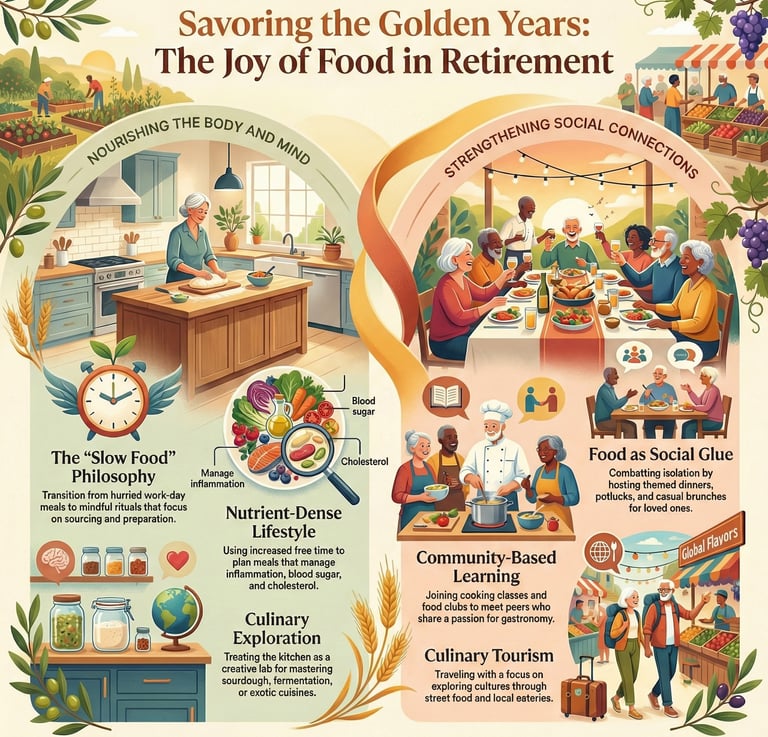Check requirements for Asia's Retirement Visas
Savoring Life's Flavors: The Joy of Food in Retirement
Retirement is often envisioned as a time of leisure, travel, and pursuing long-held passions. Among these joys, the simple yet profound pleasure of food—good, healthy, and tasty food—takes on a new dimension. In retirement, food isn't just sustenance; it becomes an art form, a social connector, and a cornerstone of well-being, enriching every aspect of this golden phase of life.
The Time to Taste: Unhurried Culinary Exploration
During working years, meals often become hurried affairs, dictated by schedules and deadlines. Retirement liberates you from this rush, opening up a world of culinary exploration:
Rediscovering the Kitchen: For many, retirement means more time to cook. This can be a journey back to cherished family recipes, an opportunity to master new cuisines, or simply the joy of preparing meals from scratch with fresh, wholesome ingredients.
Slow Food Movement: Embrace the philosophy of "slow food" – taking time to source ingredients, prepare meals with care, and savor every bite. This mindful approach to eating enhances appreciation and turns a daily necessity into a delightful ritual.
Farmers' Markets and Local Produce: With more free time, retirees can frequent local farmers' markets, connecting with producers, discovering seasonal delights, and incorporating healthier, fresher ingredients into their diet. This also supports local communities.
Culinary Adventures: Whether it's trying a new exotic fruit, experimenting with fermentation, or learning to bake sourdough, retirement offers the bandwidth for culinary adventures that were once impossible.
Food as a Pillar of Health: Nourishing the Golden Years
Good food in retirement isn't just about taste; it's intrinsically linked to maintaining health and vitality.
Mindful Eating: Without the pressures of a busy work schedule, retirees can practice mindful eating, paying attention to hunger cues, satiety, and the sensory experience of food. This can lead to better digestion and a healthier relationship with eating.
Nutrient-Rich Choices: More time allows for better planning and preparation of nutrient-dense meals. Focusing on whole grains, lean proteins, abundant fruits and vegetables, tofu and healthy fats can significantly contribute to long-term health, energy levels, and disease prevention.
Dietary Adaptations: Retirement provides the space to research and implement dietary changes that might be beneficial for specific health needs, such as managing blood sugar, cholesterol, or inflammation, without the stress of fitting it into a demanding work schedule.
Hydration and Energy: Healthy eating habits, including adequate hydration, become easier to maintain, contributing to sustained energy levels for all the activities retirement offers.
The Social Ingredient: Connecting Over Meals
Food has always been a powerful social glue, and in retirement, its role in fostering connections becomes even more significant.
Dining with Loved Ones: More time means more opportunities to share meals with family and friends. These shared experiences deepen bonds, create lasting memories, and combat potential feelings of isolation.
Hosting and Entertaining: Retirement can be the perfect time to hone your hosting skills, inviting people over for potlucks, themed dinners, or casual brunches. The act of cooking for others and sharing a meal is a profound expression of care.
Cooking Classes and Clubs: Join a cooking class to learn new skills and meet new people who share a passion for food. Food-related clubs or groups can also provide a regular social outlet.
Exploring Local Eateries: Discovering new restaurants, cafes, and local food spots with friends or partners becomes a leisurely pastime, turning dining out into a cultural and social event rather than just a convenience.
Travel Through Taste: Culinary tourism can become a highlight of retirement travel, exploring new cultures through their food, from street food stalls to Michelin-starred restaurants.
The Art of Balance: Indulgence and Well-being
The joy of food in retirement isn't about rigid restrictions but about finding a healthy balance between indulgence and well-being. It's about appreciating treats in moderation and making healthy choices the norm without sacrificing pleasure.
Guilt-Free Enjoyment: Learning to enjoy food without guilt, understanding that a balanced diet allows for occasional treats, is part of the art of a happy retirement.
Experimental Freedom: The pressure to "eat perfectly" can be replaced by the freedom to experiment, to sometimes fail, and to always learn from your culinary endeavors.
Conclusion: A Feast for the Senses
Retirement offers a unique opportunity to cultivate a richer, more intentional relationship with food. It's a chance to nourish your body, delight your palate, and connect with others in meaningful ways. By embracing the joy of good, healthy, and tasty food, retirees can add a vibrant, delicious layer to their fulfilling new chapter, truly savoring every moment and every meal.




Address
Blk 8 Cantonment Close
SIngapore